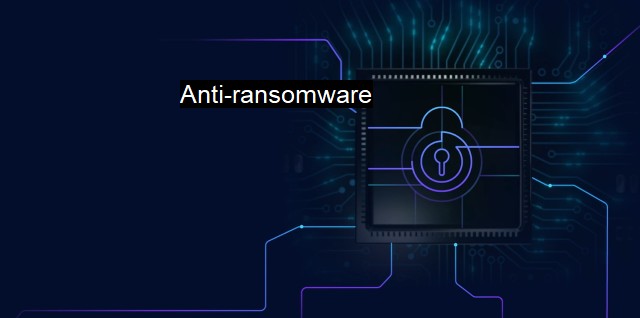What is Anti-ransomware?
The Emergence of Anti-Ransomware: An Effective Cybersecurity Solution to Combat Ransomware Attacks and Protect Critical Data
"Anti-ransomware" is a term that is increasingly spoken about by cybersecurity experts and everyday computer users alike. As part of these discussions, it is essential to understand its meaning, properties, and the need for it in the current technology driven world. Cybersecurity is the practice of protecting networks, devices, and data from malicious attacks, and is acknowledged as one of the most critical areas to focus within the world information technology. Antivirus, on one hand, is a program or set of programs that prevent, detect, and remove software viruses and other malicious software. On the other hand, anti-ransomware specifically addresses one of these malicious software types - ransomware.Ransomware is a type of malware (malicious software) that cybercriminals use to compromise a user's data, encrypt it so that the user can't access it, and demand a financial penalty to release it. Its name comes from the 'ransom' demanded by these criminals, paid, traditionally, in cryptocurrency format such as Bitcoin that ensures the culprit's anonymity.
Anti-ransomware is thus a type of software designed to detect, isolate, and remove ransomware threats from a computer, in a broader sense it is a cybersecurity strategy aimed at combating ransomware attacks. When installed on a computer or network, it not just actively monitors the system for signs of known ransomware, but also watches for behaviors common to many ransomware attacks, such as file encryption.
In contrast to conventional antivirus programs that are defined based on virus definitions - which means they use pre-existing information about known viruses to search for and remove their code from files - many anti-ransomware programs use a different security model. They work by identifying odd, out-of-bound activities in real-time that tip them off to a ransomware infection not yet in their database. In such instances, even if it wasn’t pre-written into the system to recognize the new ransomware, it might be able to intervene and protect the user's data by blocking activity and alerting the user or the network administrator.
Anti-ransomware solutions are not confined to standalone products or software. Nowadays, they are typically packaged in most comprehensive security suites or antivirus software as an added layer of defense against cybersecurity threats, and goes hand in hand with firewalls, intrusion detection systems, and other proactive measures.
The growing importance of anti-ransomware can be attributed to the increasing number of cyber threats we face today. The advent of large-scale data storage, shrinking digital archiving costs, and ease of access has unhinged a whole new level of vulnerabilities and risks. Exploits aimed at stealing vast collections of data lucratively are registered daily. In this battleground of ever-changing cybersecurity landscape, where hackers enter the fray in search of valuable data by exploiting any vulnerability they find, anti-ransomware technology provides a key deterrent.
The key takeaway is that the deployment of anti-ransomware not only directly influences the security of essential data and networks but also reflects an organization’s or an individual's comparative readiness against cyber threats. it aims to provide a buffer period for users between the onset of an attack and its neutralization, alerting them before their files start to get encrypted.
An anti-ransomware tool, frequently combined with rigorous employee training and awareness, contributes to forming an essential stratum of defense against cybersecurity threats seeking valuable data. Without anti-ransomware, entities stand vulnerable to complex, evolving ransomware threats which are increasing in number with every passing day, underscoring the non-negotiable necessity of anti-ransomware technology.

Anti-ransomware FAQs
What is anti-ransomware?
Anti-ransomware is a type of security software designed to prevent ransomware attacks from encrypting or blocking access to a victim's files, data, or entire system. It can detect, block, and remove malicious codes and prevent ransomware from running and infecting the system.How does anti-ransomware work?
Anti-ransomware works by using different techniques such as signature-based detection, behavioral analysis, and machine learning algorithms to identify and block ransomware attacks. It can also create backups, isolate and quarantine infected files, and alert users about potential threats.Do I need anti-ransomware if I have antivirus software?
While antivirus software can provide a basic level of protection against ransomware, it may not be enough to detect and block all types of ransomware attacks. Anti-ransomware software is specifically designed to stop ransomware attacks and provide additional layers of protection against this type of threat. Therefore, it is recommended to use both antivirus and anti-ransomware software for comprehensive protection.What are the best practices to prevent ransomware attacks?
To prevent ransomware attacks, it is essential to follow some best practices such as keeping software and operating systems up to date, avoiding suspicious links and attachments, creating regular backups and storing them in a separate location, using strong passwords, and implementing security measures such as firewalls, antivirus, and anti-ransomware software. Additionally, users should educate themselves and their employees about ransomware threats and how to identify and prevent them.Related Topics
Ransomware protection Cybersecurity Antivirus software Data backup and recovery Malware detection and removal
| | A | | | B | | | C | | | D | | | E | | | F | | | G | | | H | | | I | | | J | | | K | | | L | | | M | |
| | N | | | O | | | P | | | Q | | | R | | | S | | | T | | | U | | | V | | | W | | | X | | | Y | | | Z | |
| | 1 | | | 2 | | | 3 | | | 4 | | | 7 | | | 8 | | |||||||